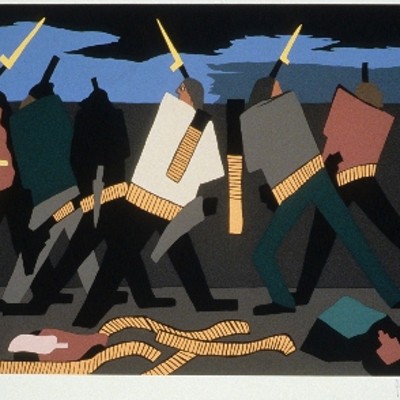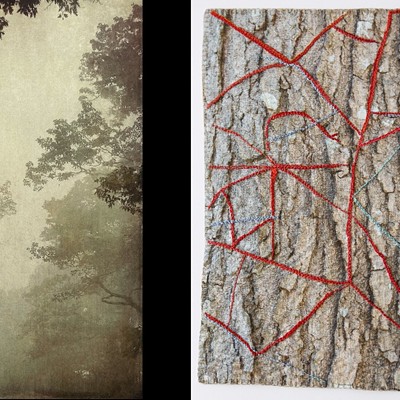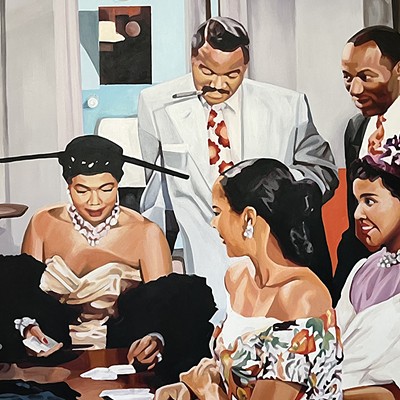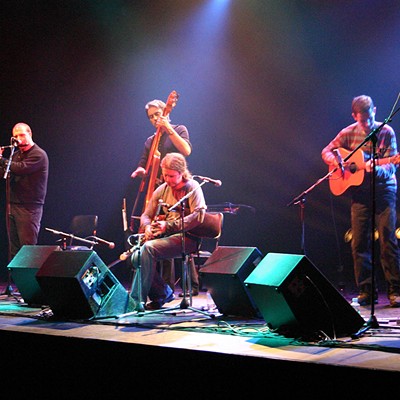Benjamín, Jaime and Salvador Chávez died in a distant California canyon, underneath a turned-over truck. They had been packed into the back with 22 other Mexicans, and when the Border Patrol gave chase, their driver apparently panicked and tore through the curving roads at top speed. When the truck flipped, 19 were injured and eight died. The Chávez brothers, en route to Watsonville to pick strawberries, were crushed.
The writer Rubén Martínez, who will give a reading next Wednesday at the UA as the first installment of this year's prose series, happened to be in Mexico City at the time of the deaths. He was struggling to write a book about the relationship between the U.S. and Mexico, he said last week by phone from northern New Mexico, after "bullshitting my way" to a contract via a vague book proposal. He had started looking at religion.
But the mass deaths, with the tragic loss of so many lives in one family, not only were big news in the U.S., they made headlines in "every paper in Mexico," Martinez remembered. They also changed the direction of his book. Prodded by his editors, he sought out the remaining family members; his macro-study of religion became a micro-study of one family and migration. He called it Crossing Over: A Mexican Family on the Migrant Trail (Picador, paperback edition, 2001).
"The goal of the book was to illuminate the debate about the border," Martínez said. "What was missing was the voices of immigrants themselves. What could I do as a writer? Immersion reporting.
"The thought of it sickens me: pushing a microphone in the face of a grieving mother. The family was quiet at first. I was probably the 12th or 13th journalist to interview them. I was the last in a long line of people prying into their lives."
The difference was that Martínez stuck around--for years. He got to know the Chávezes and the history of their town, and followed them from Cherán, Michoacán, to the U.S., on a circuitous journey that ended in St. Louis. The book was not only about "the tragic power of the family's story," he said, but about "the town of Cherán itself, which is turbulently transcultural," filled with people who regularly rotate between their jobs in the U.S. and their Indian lives in a town west of Mexico. Satellite dishes sprout among the wooden crosses on the rooftops, he wrote, sending up competing signals to CNN and God.
"People wore this cultural experience in their bodies," he said, "the way they spoke, the way they built their houses, the clothes they wore." And if this new cultural mix was changing their ancient Indian village, so it will change their adopted home in the North.
Martínez had done plenty of border reporting before Crossing Over. He worked at the LA Weekly in the late '80s and early '90s, and became an editor at Pacific News Service, an "ethnic media outlet," in San Francisco after that. And he had written two books about his home city of Los Angeles, East Side Stories: Gang Life in East L.A. (with Joseph Rodriguez) and The Other Side: Notes from the New L.A., Mexico City, and Beyond.
The debates on immigration haven't changed much since the founding of the U.S., he said. Even the beloved Benjamin Franklin railed against the pesky Germans in Philadelphia in the 18th century, accusing them of clinging to their own language and each other.
"The rhetoric never changes," Martínez said. "It's always about the 'stranger in our midst.' Every culture has that language of nativism, and the idea of the nation-state defending itself. We talk about the Other with a capital O. It's the way Mexicans talk about Central Americans, and the way the Chinese talk about the Japanese."
But while Martínez was writing the book, the debate grew more rancorous. Pete Wilson ran for governor of California on a "nativist platform. Bill Clinton started the wall-building along the border." It was Clinton, he noted, and not President Bush, who initiated Operation Gatekeeper in the cities, a policy that would push more migrants into the deadly deserts--and help create a record number of deaths every year since.
When the book was finished, however, the terms of the debate shifted drastically. It came out on Sept. 1, 2001, and the cataclysm of 9/11 turned everyone's attention to national security.
"The nativists changed tactics," Martínez said. "Now they were saying, 'The (immigrant) guy with the leaf blower could be Al-Queda.'"
It was telling, he said, that the Minutemen who patrolled the Arizona-Mexico border last spring found their very first border trespasser to be a dehydrated migrant, not a terrorist operative.
"The vigilantes go out of their way to say they're not racist, but in every meaningful way, that's exactly what they are. It's the invasion of the Brown menace with a capital B."
Martínez argues that it's disingenuous not to acknowledge the economics that drive immigration.
"As if they were not being lured by the carrot we're offering them" of jobs that need to be filled, he said. "An unemployed Mexican? That's an oxymoron. A homeless Mexican? That's another oxymoron. Mexicans have the highest workforce participation (of any group in the U.S.). Virtually everyone is working."
Martinez, now an associate professor of creative writing at the University of Houston, in the last year broadened the scope of his reporting. He wrote a companion volume to the recent PBS series The New Americans, telling the tale of migrants from Nigeria, Palestine, India and the Dominican Republic, as well as Mexico.
"It's a natural extension of the work I've been doing on immigration for 20 years," he said. "It's just an expansion of the North-South paradigm."
His current project is about the "fracturing" of the Southwest, where prosperous boom towns co-exist with desperate poverty, and where people die in the desert while others go on with their everyday lives.
"People can live side by side in such tremendous intimacy and not be aware of each other," he said. "Rio Rico (in southern Arizona) has all these nice retirement houses, and the retirees see the migrants crossing." He also plans to go to the west deserts, to research the phenomenon of "migrants crossing and dying on the Tohono O'odham reservation."











